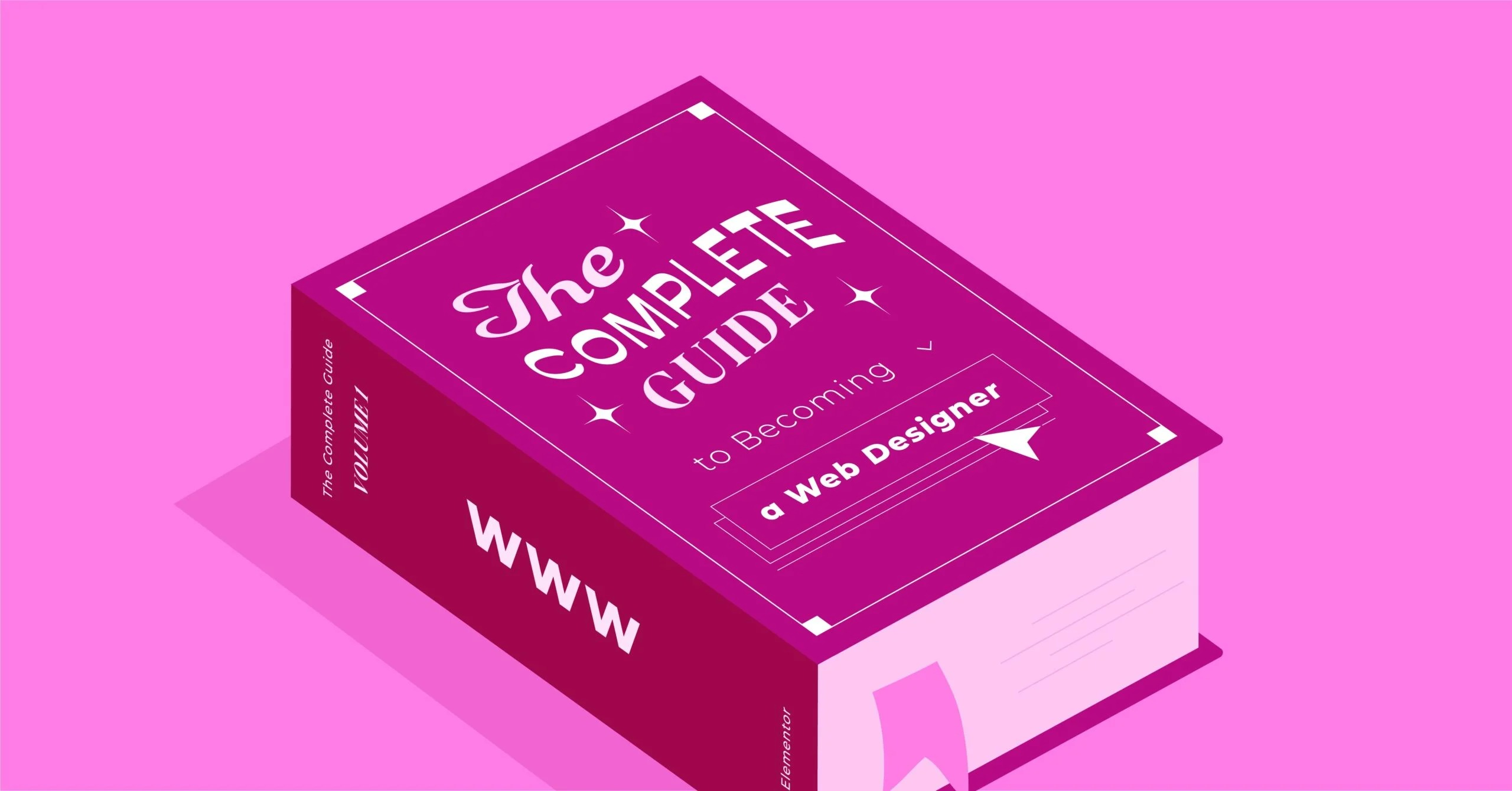Table of Contents
This guide will take a deep dive into the world of AI-powered web creation. We’ll explore how this technology works, what features to look for, and who can benefit most from it. Most importantly, we’ll provide a detailed analysis of the best AI website builders on the market today, helping you choose the perfect platform to bring your vision to life. Whether you’re launching your first blog, an online store, or a portfolio, the right AI tool can serve as your co-pilot, guiding you from a simple idea to a fully functional, beautifully designed website faster than ever before.
Key Takeaways
- AI Simplifies Web Creation: AI website builders automate complex tasks like design, content generation, and SEO, making it possible for anyone to create a professional website without technical skills.
- Core Features to Look For: The best platforms offer a suite of AI tools, including an AI Site Planner, text and image generators, intelligent design assistants, and automated SEO optimization.
- Elementor AI Leads the Pack: Elementor AI stands out by integrating its powerful AI capabilities directly into the flexible and extensible WordPress ecosystem, offering a solution that is both user-friendly for beginners and powerful enough for professionals.
- Ecosystem Matters: Look for a builder that offers an integrated platform. A complete solution like Elementor combines the builder with optimized hosting, performance tools, and marketing features, providing a seamless and reliable experience.
- From Planning to Launch: Modern AI tools assist in the entire website creation lifecycle. Tools like the Elementor AI Site Planner can take you from a basic concept to a structured sitemap and wireframe in minutes, streamlining the initial, most challenging phase of a project.
- Specialization is Key: While many builders offer general features, some excel in specific areas. For instance, Elementor Pro’s WooCommerce Builder provides unmatched customization for online stores.
- Freedom vs. Simplicity: The market is divided between closed-source SaaS platforms (like Wix and Jimdo), which offer simplicity but limit control, and open-source based solutions like Elementor for WordPress, which provide a “best of both worlds” approach—combining ease of use with total creative freedom and data ownership.
How AI is Reshaping Website Creation
Traditionally, building a website involved a series of distinct, often complex steps: planning the structure, designing the layout, writing the content, sourcing images, and optimizing for search engines. This process required a combination of strategic thinking, design skill, and technical knowledge. AI website builders consolidate and simplify this workflow by integrating intelligent automation at every stage.
At its core, an AI website builder uses machine learning algorithms trained on vast datasets of successful websites. These algorithms can identify effective design patterns, understand user engagement principles, and generate human-like text and visuals. When you provide the AI with initial inputs—such as your industry, business name, and desired style—it uses this knowledge to generate a unique, relevant, and functional website foundation.
This isn’t just about picking a template. The AI actively participates in the creation process. It can:
- Generate a complete sitemap and wireframe based on your goals.
- Suggest multiple design layouts, color palettes, and font pairings that align with your brand identity.
- Write compelling headlines, product descriptions, and “About Us” pages tailored to your business.
- Create custom images from text prompts, eliminating the need to search for stock photos.
- Automatically optimize meta titles, descriptions, and image alt text for better search engine visibility.
This collaborative approach between human and machine is the hallmark of modern web creation. It frees you from the tedious, technical aspects of the job, allowing you to focus on the strategic and creative elements that truly define your brand.
The Best AI Website Builders of 2026
The market for AI website builders is expanding rapidly, with different platforms catering to various needs, skill levels, and budgets. Here’s a detailed look at the top contenders, analyzing their strengths, weaknesses, and unique AI capabilities.
1. Elementor AI: The Professional’s Choice for WordPress
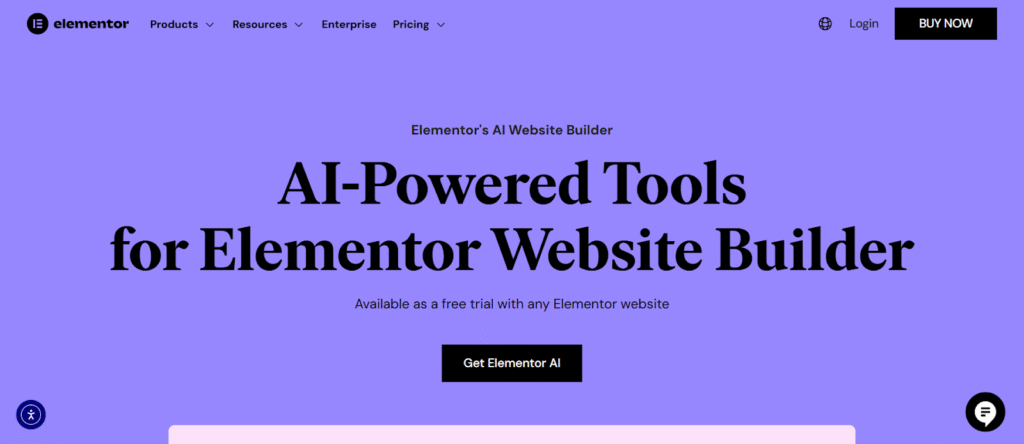
Elementor has long been the dominant force in the WordPress page builder space, empowering millions of users to create custom websites with its intuitive drag-and-drop editor. With the introduction of Elementor AI, it has transformed from a powerful builder into a comprehensive AI-powered web creation platform, seamlessly integrating artificial intelligence into the world’s most popular content management system.
This deep integration with WordPress is Elementor’s primary advantage. It combines the ease of AI-driven creation with the unparalleled flexibility, scalability, and ownership of the open-source WordPress ecosystem. You get the guided, intelligent experience of a modern AI builder without being locked into a proprietary platform.
Key AI Features
Elementor’s AI suite is designed to assist throughout the entire creation workflow, from initial concept to final polish.
- AI Site Planner: This free tool is a game-changer for the planning phase. You start with a simple description of your project, and the AI engages you in a chat-based discovery process. It then generates a complete website brief, a structured sitemap, and a fully interactive, stylized wireframe. This condenses hours of strategic work into minutes and provides a solid, professional foundation for any project.
- Generative Text & Content: Right inside the editor, you can generate headlines, paragraphs, and calls-to-action. The AI is context-aware; it understands what you’re working on and provides relevant suggestions. You can ask it to write an “About Us” section, create a list of services, or refine existing text to be more persuasive, change its tone, or translate it into another language.
- Image Generation & Editing: Forget endlessly scrolling through stock photo sites. Elementor AI allows you to generate unique, high-quality images from simple text prompts. You can create hero images, product mockups, or abstract backgrounds that perfectly match your brand. The AI also includes powerful editing features, allowing you to extend an image’s background (outpainting), remove unwanted objects, or create variations of a generated image.
- AI Code Assistant: For those who want to push the boundaries of design, the AI Code Assistant is an invaluable tool. You can ask it to generate custom CSS snippets to create unique animations, apply complex gradients, or fine-tune element styling—all without needing to be a coding expert.
- Agentic AI with Angie: Pushing the boundaries of automation, Elementor’s upcoming Agentic AI assistant, Angie, is designed to perform multi-step tasks across your entire WordPress site. You can give it high-level commands like “Create a landing page for the new spring collection” or “Run a performance audit and fix any issues,” and Angie will execute the entire workflow. This represents a monumental leap in productivity for web professionals.
The Elementor Ecosystem
Elementor’s strength extends beyond its AI features. It offers a complete, integrated platform that addresses the entire lifecycle of a website.
- Elementor Hosting: To eliminate the performance and security issues common with generic hosting, Elementor provides a managed WordPress hosting solution built on the Google Cloud Platform. It is specifically optimized for Elementor websites, guaranteeing top-tier speed, ironclad security, and a single point of contact for support. When you combine Elementor Pro with Elementor Hosting, you get the seamless, worry-free experience of a SaaS platform with the freedom of WordPress.
- Theme & Template Library: For professionals, the minimalist Hello Theme provides the perfect blank canvas for custom designs built with the Elementor Pro Theme Builder. For beginners, the new Hello Biz theme offers a guided onboarding experience to get a business site live quickly. This is complemented by a vast template library of professionally designed website kits that can be imported and customized.
- Specialized Tools: The ecosystem includes powerful plugins that solve critical WordPress pain points. TheImage Optimizer automatically compresses images for faster load times. TheSite Mailer ensures reliable delivery of transactional emails.Ally by Elementor helps you build more inclusive and compliant websites.
Ease of Use & Target Audience
Elementor caters to a broad audience. Its visual, drag-and-drop editor is intuitive enough for beginners to grasp quickly. At the same time, its deep feature set—including the Theme Builder, WooCommerce Builder, and custom code capabilities—provides the power and flexibility that professional designers and agencies demand.
The AI features are seamlessly integrated, appearing exactly where you need them. This makes the learning curve gentle and the workflow incredibly efficient.
Pricing
Elementor’s pricing is flexible. You can get started with the powerful free version of the builder. To unlock the full suite of AI features, professional widgets, and advanced builders, you’ll need an Elementor Pro plan. The AI features operate on a credit-based system, with a generous number of free credits included with Pro plans and affordable options to purchase more.
Pros & Cons
Pros:
- Unmatched Flexibility: Built on WordPress, offering limitless customization and extensibility.
- Comprehensive AI Suite: AI tools that cover the entire workflow from planning to content, images, and code.
- Integrated Ecosystem: A complete platform with hosting, themes, and utility plugins from a single provider.
- Scalability: Perfect for everything from a simple blog to a complex eCommerce store or a large agency managing hundreds of sites.
- Full Data Ownership: You are never locked into a proprietary system.
Cons:
- Learning Curve for Advanced Features: While the basics are easy, mastering features like the Theme Builder can take some time.
- Requires WordPress: You need to have a WordPress installation, though Elementor Hosting simplifies this to a one-click setup.
2. Wix ADI (Artificial Design Intelligence)
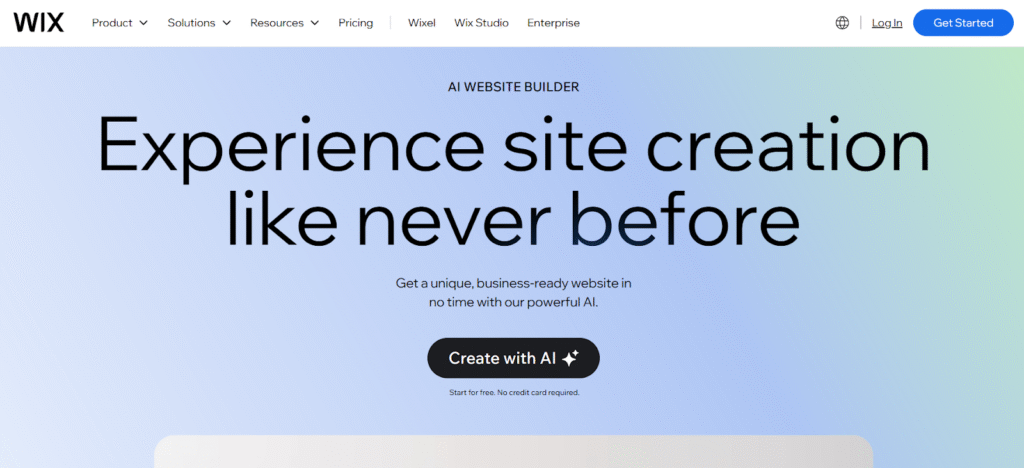
Wix has been a leader in the user-friendly website builder space for years, and its Wix ADI (Artificial Design Intelligence) is one of the most established AI-powered creation tools on the market. It is designed for absolute beginners who want to get a website online as quickly and easily as possible.
The process begins with a simple questionnaire. Wix ADI asks for your business name, industry, and the features you need (e.g., a blog, an online store, a booking system). It then presents a few style preferences and uses this information to automatically generate a complete website, including text and images.
Key AI Features
- Automated Site Generation: Wix ADI’s core strength is its ability to create a full, multi-page website in minutes. It populates the site with relevant content sections and pulls in professional images from its library.
- Smart Content Suggestions: The AI writes initial drafts of headlines and paragraphs based on your industry. While often generic, this provides a helpful starting point that users can then edit.
- AI Text Creator: Similar to other platforms, Wix offers a tool within its editor to generate or rephrase text for specific sections like product descriptions or mission statements.
Ease of Use & Target Audience
Wix ADI is exceptionally easy to use. The guided, step-by-step process removes all guesswork. This makes it an ideal choice for users with zero technical or design experience—small business owners, hobbyists, or anyone needing a simple online presence with minimal effort.
However, this simplicity comes at a cost. Once the site is generated by ADI, you can make basic edits to text and images. For more advanced customization, you must switch to the standard Wix Editor, and once you do, you cannot go back to the ADI interface.
Pricing
Wix operates on a freemium model. You can build and publish a site for free, but it will have Wix branding and a Wix domain. To connect a custom domain, remove ads, and access features like eCommerce, you must upgrade to one of their premium plans.
Pros & Cons
Pros:
- Extremely Fast: You can have a live website in under 10 minutes.
- Very Easy for Beginners: The questionnaire-based approach is foolproof.
- All-in-One Platform: Hosting, domain, and editor are all included in one package.
Cons:
- Limited Customization: The ADI-generated designs can feel formulaic, and deep customization is restricted.
- Proprietary Platform: You are locked into the Wix ecosystem and cannot migrate your site to another host.
- Less Powerful AI: The AI focuses primarily on the initial site generation and offers less sophisticated content and image creation tools compared to competitors like Elementor.
3. Jimdo Dolphin
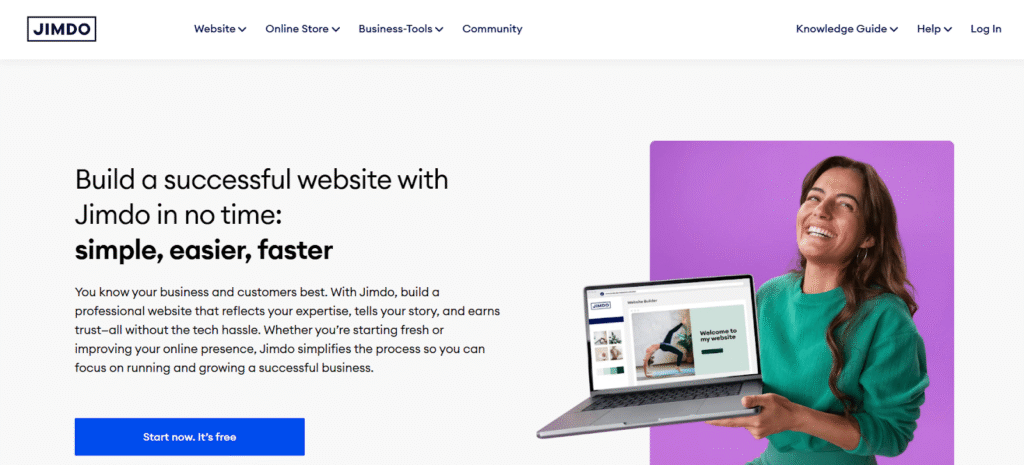
Jimdo is another platform that focuses on making website creation as simple as possible for users without technical skills. Its AI-powered builder, named Dolphin, operates on a similar principle to Wix ADI.
The process is very straightforward. You answer a few questions about your business and goals, connect your social media accounts (which it can use to pull in existing content and images), and choose a design style. Dolphin then assembles a website for you in about three minutes.
Key AI Features
- Automated Website Assembly: Dolphin’s main AI function is to quickly build a site based on your inputs. It creates the structure, adds initial text, and finds relevant photos.
- Industry-Specific Content: The AI pulls from a library of pre-written text blocks tailored to different industries, which helps to ensure the initial content is relevant.
- Auto-Generated SEO Settings: Dolphin automatically fills in basic SEO information like page titles and descriptions, which is helpful for beginners who may not be familiar with these concepts.
Ease of Use & Target Audience
Jimdo Dolphin is designed for the ultimate beginner. If the idea of a drag-and-drop editor still sounds intimidating, Dolphin’s point-and-click interface is even simpler. It’s an excellent tool for small local businesses, sole proprietors, or anyone who needs a basic, professional-looking “online business card.”
The trade-off, once again, is a lack of control. Customization options are significantly more limited than even the standard Wix editor. You can change colors, fonts, and images, but you cannot freely drag and drop elements or fundamentally alter the layout of sections.
Pricing
Jimdo offers a free plan with a jimdosite.com subdomain and advertising. Paid plans are very affordable and add features like a custom domain, ad-free experience, and basic eCommerce functionality.
Pros & Cons
Pros:
- Incredibly Simple and Fast: Arguably the easiest and fastest way to get a basic website online.
- Affordable: The paid plans are budget-friendly for small businesses.
- Mobile-Optimized by Default: All designs are fully responsive.
Cons:
- Highly Restrictive: Very little creative freedom or design control.
- Basic Features: The blogging and eCommerce tools are not as robust as those on other platforms.
- Not Scalable: Not suitable for businesses that anticipate significant growth or require complex features.
4. Hostinger AI Website Builder
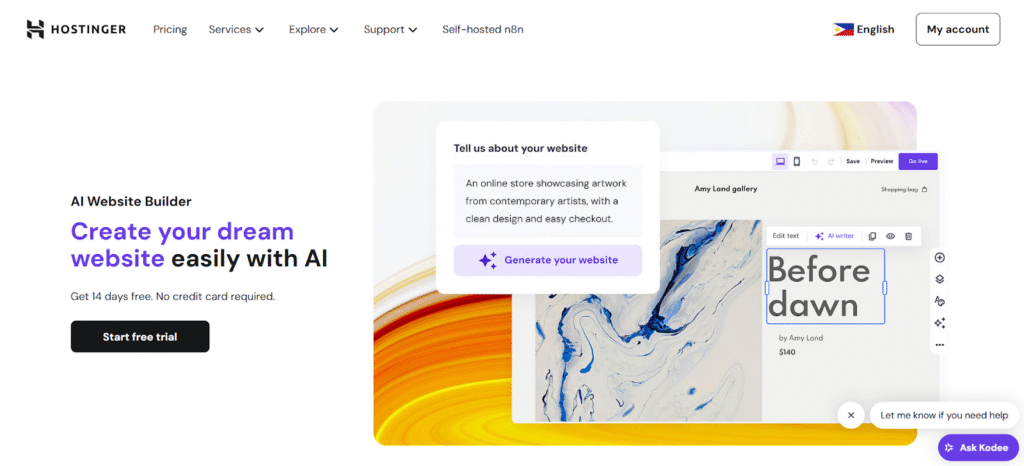
Hostinger, a well-known web hosting provider, has integrated a powerful AI website builder into its offerings. This builder packs an impressive suite of AI tools that go beyond simple site generation, making it a strong contender in the market.
Unlike Wix ADI or Jimdo Dolphin, Hostinger’s builder provides a more hands-on, drag-and-drop experience from the start, but with AI assistants available at every step to help with content and design.
Key AI Features
- AI Writer: A robust content generation tool that can write SEO-friendly copy for any part of your website. You can select a category and topic, and it will produce unique text.
- AI Logo Maker: A handy tool for new businesses. You can input your company name and industry, and it will generate a variety of logo options that you can customize and download.
- AI Heatmap: A unique feature that predicts user attention. Before you even publish your site, the AI can analyze your page layout and generate a heatmap showing where visitors are most likely to look and click. This helps you optimize your calls-to-action and important information for maximum impact.
- AI Image Tools: The builder includes an AI image upscaler and background remover, which are practical tools for improving photo quality.
Ease of Use & Target Audience
Hostinger’s AI Builder strikes a good balance between simplicity and control. The grid-based drag-and-drop editor is intuitive and prevents users from accidentally creating messy layouts, but it still offers more flexibility than Jimdo. This makes it a great choice for small business owners and entrepreneurs who want an easy-to-use tool but also desire a bit more creative freedom.
As a web creation expert, Itamar Haim notes, “The real power of AI in web design isn’t just automation; it’s augmentation. Tools that provide data-driven insights, like Hostinger’s AI Heatmap, empower creators to make smarter design decisions from day one, leading to better user engagement and higher conversion rates.”
Pricing
The AI Website Builder is included with Hostinger’s hosting plans, making it an excellent value proposition. There is no free plan, but the introductory prices for their hosting packages are very competitive.
Pros & Cons
Pros:
- Excellent Suite of AI Tools: The AI Writer, Logo Maker, and Heatmap are genuinely useful features.
- Great Value: Bundled with affordable and reliable hosting.
- User-Friendly Editor: Easy to learn and use, even for beginners.
Cons:
- Limited Extensibility: As a closed platform, you cannot add custom code or install third-party apps beyond what is offered.
- Less Design Flexibility: The grid system is easier for beginners but offers less pixel-perfect control than a builder like Elementor.
Comparison Table of the Best AI Website Builders
| Feature | Elementor AI | Wix ADI | Jimdo Dolphin | Hostinger AI Builder |
| Platform | WordPress (Open-source) | Proprietary (SaaS) | Proprietary (SaaS) | Proprietary (SaaS) |
| Core AI Function | Integrated Workflow Assistant | Automated Site Generation | Automated Site Assembly | AI-Assisted Editor |
| AI Content | Advanced text generation, rewriting, translation | Basic text suggestions | Pre-written industry text | SEO-focused AI Writer |
| AI Images | Text-to-image generation, editing, outpainting | Stock image selection | Stock image selection | Upscaler, background remover |
| Unique AI Feature | AI Site Planner, Agentic AI (Angie) | Questionnaire-based setup | Social media content import | AI Heatmap, Logo Maker |
| Ease of Use | Moderate (Easy for basics) | Very Easy | Extremely Easy | Easy |
| Customization | Very High | Low (in ADI) / Medium (in Editor) | Very Low | Medium |
| Best For | Professionals, Agencies, Businesses wanting control | Absolute beginners, quick setup | Hobbyists, local businesses, simplicity | Small businesses, DIYers wanting value |
| Free Plan | Yes (builder), AI has free tier | Yes (with ads) | Yes (with ads) | No |
How to Choose the Right AI Website Builder for You
Selecting the best AI website builder depends entirely on your individual needs, goals, and technical comfort level. Here are a few scenarios to guide your decision:
- You’re a professional designer or an agency: You need power, flexibility, and scalability. Elementor AI is the clear choice. Its integration with WordPress gives you complete creative control and the ability to build any type of site for your clients, while its advanced AI tools dramatically accelerate your workflow.
- You’re a small business owner who wants to grow: You need a platform that is easy to start with but won’t limit you in the future. Elementor AI on a managed eCommerce hosting plan is an excellent fit. You can start with a simple site and easily scale up to a full-featured online store with advanced marketing capabilities. Hostinger is a good budget alternative if you are confident you won’t need advanced features later on.
- You’re an absolute beginner and need a website online today: Your priority is speed and simplicity. Wix ADI or Jimdo Dolphin are your best bets. They will get you from zero to a live website faster than any other option, but be prepared for the trade-off in customization.
The Future of Web Creation is Collaborative
AI website builders are not here to replace web designers; they are here to empower creators. By handling the repetitive and technical tasks, these intelligent tools free up human creativity to focus on strategy, branding, and user experience. The future of web design is a collaborative partnership between human vision and artificial intelligence, working together to build a more beautiful, functional, and accessible web for everyone.
Whether you’re taking your first step online or you’re a seasoned professional looking to boost your productivity, embracing an AI-powered platform is a strategic move. By choosing a tool that aligns with your goals, you can build a powerful online presence more efficiently and effectively than ever before.
Frequently Asked Questions (FAQ)
1. Can I really build a website with AI if I have no coding skills? Absolutely. That is the primary purpose of AI website builders. They use intuitive interfaces, guided processes, and automated tools to handle all the technical aspects, allowing you to focus on your content and design ideas. Platforms like Wix ADI and Jimdo Dolphin are specifically designed for users with zero technical background.
2. Will my AI-generated website look generic? This is a valid concern. Early AI builders often produced cookie-cutter sites. However, modern platforms have become much more sophisticated. Builders like Elementor AI give you a powerful foundation and then provide extensive customization tools to make the design uniquely yours. You can change every color, font, layout, and image to ensure your site reflects your brand.
3. What is the difference between an AI website builder and a regular template-based builder? A template is a static, pre-designed layout. You pick one and then fill it with your own content. An AI website builder is a dynamic and interactive tool. It asks you about your needs and then generates a unique design and content structure specifically for you. It’s a more personalized and intelligent starting point.
4. Can an AI website builder create an online store? Yes, most top-tier AI builders have robust ecommerce capabilities. For example, Elementor Pro includes a powerful WooCommerce Builder that allows you to use AI to help design and customize every part of your online store, from product pages to the checkout process, giving you full control over the customer experience.
5. How does AI help with SEO? AI assists with SEO in several ways. It can generate SEO-friendly content with relevant keywords. It automatically handles technical SEO tasks like creating meta titles and descriptions, adding alt text to images, and ensuring mobile responsiveness. Some platforms, like Jimdo, handle these tasks automatically in the background, while others, like Elementor, give you the tools and suggestions to optimize them yourself.
6. Do I own my website if I build it with an AI platform? This is a critical question. If you use a proprietary SaaS platform like Wix or Jimdo, you do not fully own your website. You are essentially licensing the software and hosting. You cannot move your site to another provider. With a solution like Elementor on WordPress, you have 100% ownership of your data and your website. You can move it, modify it, and host it anywhere you choose, giving you complete freedom and control. You can even get a free domain name with some hosting plans.
7. Can the AI write all the content for my website? Yes, it can. Tools like Elementor AI and Hostinger’s AI Writer can generate all the text you need for your pages, from headlines to detailed service descriptions. However, the best practice is to use the AI-generated text as a high-quality first draft. You should always review and edit it to add your unique brand voice, personal stories, and specific details that only you can provide.
8. Is it expensive to use an AI website builder? The cost varies. Many platforms, including Elementor, Wix, and Jimdo, offer free plans to get started. Paid plans that unlock more features and remove ads are generally very affordable, often starting around $15-$30 per month. The value they provide in terms of time saved and professional results usually far outweighs the cost.
9. Can I switch from an AI-generated design to a more custom one later? It depends on the platform. With Wix ADI, switching to the standard editor is a one-way trip; you can’t go back. With Elementor, the AI is integrated directly into the standard editor. You can use it as much or as little as you want. You can start with an AI-generated layout and then take full manual control to customize every single detail, offering the best of both worlds.
10. What is the most important factor to consider when choosing an AI website builder? The most important factor is your long-term goal. If you just need a simple, static site quickly, a platform focused on ease of use like Wix or Jimdo is fine. However, if you plan to grow your business, need unique functionality, or want full control over your brand and data, you must choose a flexible and scalable platform. An open-source based solution like Elementor AI provides a foundation that can grow with you, ensuring you’ll never be limited by your initial choice.
Looking for fresh content?
By entering your email, you agree to receive Elementor emails, including marketing emails,
and agree to our Terms & Conditions and Privacy Policy.
